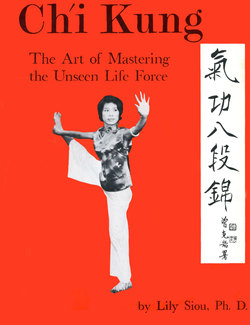Читать книгу Chi Kung - Lily Siou - Страница 12
На сайте Литреса книга снята с продажи.
ОглавлениеChapter 2: Chinese concept of ch'i and kung
By understanding what "the unseen life force" is, we can readily grasp the concept of Ch'i." In Chinese, Ch'i means the flowing of the unseen life force. Because of the differences between Western and Eastern culture, there can be no exact translation of the Chinese character, Ch'i ( ). In Chinese, the character for Ch'i symbolizes the original mentality and vitality of the individual. These two sources conjoin to create a nurturing energy which is best defined in English as the internal body energy or the unseen life force.
In Chinese biological terms, Ch'i is the main influence in bringing greater physiological vitality and psychological stability.
In Chinese, "Ch'i" literally means: breath, health, steam, air, and weather. The character for Ch'i is often seen on Taoist "good luck" charms to bring good health or hygiene.
The character, Ch'i, is widely used in combination with other characters to form new words. "Ch'i Fa" means vaporization or successive changes. "Ch'i Hou" is a solar term meaning weather or climate. In ancient China, an "hou" ( ) was a five day unit. Three "hous" constituted a "chiai", and a "chiai ch'i" ( ) was one of the 24 calendar divisions in a year.
In Chinese philosophy, the "Er ch'i" ( ) means the dual powers of the Yin and the Yang. The literal meaning of "Er ch'i" is "double original force."
Most of the Chinese martial arts depend on the cultivation of the Ch'i, or body energy. By doing so, one is in harmony with the universe. One is more powerful and more aware. "liang ch'i" ( ) is one of the Taoist breathing control exercises that help to develop the Ch'i.
Ch'i also means manner, demeanor, constitution, temper, or life-giving force. "Li ch'i" means strength, power, or vigorous constitution. "Yuan ch'i" means inherited constitution.
In Chinese religion, Ch'i is the soul or the spirit. If the Ch'i leaves the body, then man would be just a body without life or the will to live. Ch'i is the source which nourishes the existence of life. Man is born with Ch'i, or the unseen life force. Without Ch'i, man is an empty body. The Taoists believe that man is made up of three "Ch'is: (1) the principle of constitution, (2) the original constitution, (3) the true spirit of constitution.
Ch'i has great significance in every field of human endeavor. A writer is said to need "Wen ch'i" or a literary or scholarly disposition. A calligrapher needs a special characteristic or style of brush control called "pi chi." A hero needs heroic style or heroic comportment called "Ch'i Tzu." A professional speaker needs a charismatic and expressive style of speech called "Yu Ch'i." And the average person needs proper understanding of his natural capacity to deal with people called "Ch'i Liang."
In this book, Ch'i means the flowing of the unseen life force. In instances where Ch'i means something else, the usage of the term will be explained.
The Chinese character Kung symbolizes physical power and the manifestation of this power in the natural movements of the body. The unity or natural integration of physical power and movement is the technique and power of Art. This Art is the means to nurturing the Ch'i or the flowing of the unseen life force. And this is called Kung.
In Chinese literature, Kung means: merit, achievement, efficacy, and good results. "Kung Hsi" ( ) means successful undertaking, or a great stock of merit and ability. In everyday language, Kung means action. "Kung Yung" ( ) means power in action or the beneficial result of an operation or function. When "Kung" is used for right action, it has beneficial results. When an acupuncturist uses one small needle to cure a big illness, we say that the operation was "Kung Yu" ( ) or a divine efficacy.
In this book, Kung means the power of action and movement. This is like the movement of the Ch'i Kung sequence.
Ch'i and Kung have been explained separately to give a fuller understanding of what these terms mean. The two characters are applied in many different ways with different meanings.
Ch'i signifies the flowing of internal energy which is manifested in the sequence shown in the pictures. The flowing sequences suggest how the internal energy should be flowing inside.
Kung signifies the external power of Art. This is shown by the hand, body, and feet movements in the pictures.
Through the practice of Ch'i Kung, one gains the Art of internal and external power and strength.
With this knowledge of internal force and external power, we can apply ourselves more efficiently in our daily living. Our ancestors learned to use trees for building houses and other things. In the same way, man can learn to use the unseen life force to live a more fulfilling life.
